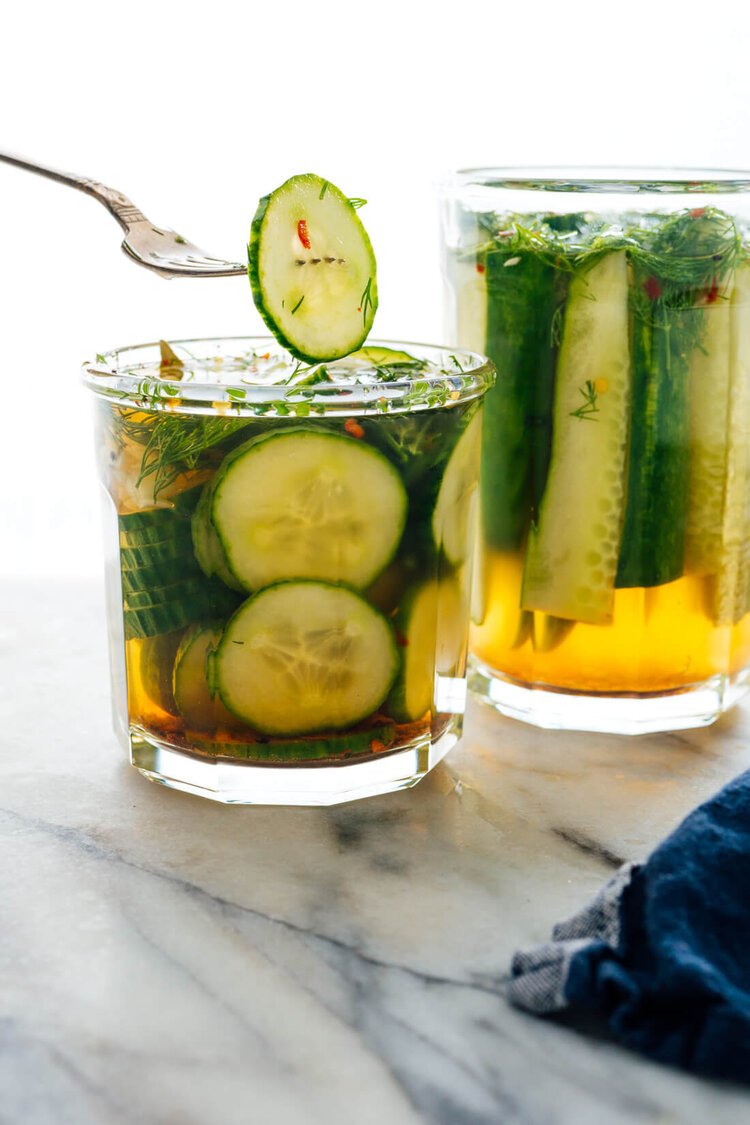Easy Homemade Pickles
Cucumbers are 95 percent water so it is no surprise that few foods are as cool as a cucumber. They are low calorie and contain many nutritional benefits, including hydrating properties and valuable nutrients. There are hundreds of varieties of cucumber, and they come in dozens of colors, but the edible types are classified as being for either slicing or pickling. Slicing cucumbers are cultivated to be eaten fresh, while pickling cucumbers are intended for the brine jar. Slicing cucumbers are usually larger and thicker-skinned than pickling ones.
Cucumbers are good sources of phytonutrients (plant chemicals that have protective or disease preventive properties) such flavonoids, lignans and triterpenes, which have antioxidant, anti-inflammatory and anti-cancer benefits.
Helps digestion. Fermented pickles are full of good bacteria called probiotics, which are important for gut health.
Fights diseases. Cucumbers are high in an antioxidant called beta-carotene, which your body turns into vitamin A. Carotene is a powerful compound that’s been shown to help lower your chances of dying of heart disease, stroke, cancer, respiratory diseases, and other conditions.
May ease muscle cramps. Some athletes swear by pickle juice after exercise to quickly replace lost electrolytes. One study found that pickle juice may work slightly better than water to relieve muscle cramps. But the evidence is weak.
Curb sugar spikes. Pickle juice, specifically the vinegar in it, may help keep your blood sugar levels even. That may benefit people who are at risk for diabetes.
How to Pickle at Home
There are two main ways to make pickles yourself. One way is to brine them in vinegar. The other way is to ferment the cucumbers with just salt and water. No matter the method, follow these general tips:
Pick cucumbers that are fresh, firm, and damage-free.
Use canning or pickling salt. Other salts cloud up the brine.
Add dill seed, horseradish, mustard seed, garlic, and any other spices.
Follow boiling and canning instructions carefully to prevent bad bacteria from growing inside.
Keep pickles in sealed jars for several weeks before you eat them.
Information gathered from: https://www.webmd.com/food-recipes/health-benefits-pickles
Easy Homemade Pickles
INGREDIENTS
1 medium-to-large cucumber or 2 small cucumbers (ideally 12 ounces total)*
1/2 cup water, at room temperature or cooler
1/2 cup rice vinegar
1 1/2 tablespoons maple syrup or sugar
1 1/2 teaspoons fine sea salt
1/4 teaspoon red pepper flakes (optional, for heat)
20 twists of freshly ground black pepper
2 leafy sprigs of fresh dill, roughly chopped (about 1/4 cup)
2 cloves garlic, peeled and smashed
1 bay leaf
INSTRUCTIONS
For pickle rounds (“chips”), slice the cucumber(s) into thin rounds, about 1/8-inch thick. Or, for spears, slice them in half lengthwise, then slice the halves lengthwise into quarters, then slice the quarters lengthwise into eighths. If your spears are long like mine (from one long cucumber), slice them through the middle so they’re not too tall for your jar. Set aside.
In a liquid measuring cup or bowl, combine the water, vinegar, maple syrup, salt, red pepper flakes (if using) and black pepper. Stir until most of the salt has dissolved into the liquid, about 30 seconds to 1 minute. Set aside.
Place the cucumbers into a wide-mouth jar about 3 to 4 inches in diameter, tall enough to offer at least 1 inch of extra space on top (for pickle spears, it’s important that all the pickles fit snugly, vertically—a wide-mouth pint-sized mason jar would work well).
Top the cucumbers with the dill and garlic. Tuck the bay leaf into the side of the jar. Pour the all of the liquid over the cucumbers so they’re fully submerged. Cover and refrigerate for at least 1 hour (for pickle rounds) or at least 3 hours (for pickle spears). The flavor will continue to develop over the next couple of days. These pickles will keep for up to 3 weeks in the refrigerator.
NOTES
*Cucumber options: For thinly sliced pickles, I love to use English (seedless) cucumbers. Kirby, Persian and garden-variety cucumbers will also work great. For pickle spears, use two Kirby or small garden cucumbers (about 6 ounces each). Or, use one longer garden cucumber (about 12 ounces) as shown here—you’ll just need to slice the spears in half through the middle so they’re not too tall for your jar.
Change it up: For sweeter pickles (bread and butter pickles), you’ll need to add a lot more maple syrup (which will make the mixture more brown) or sugar. Add it to the vinegar mixture, to taste, before pouring it over the cucumbers. Sweetness is so subjective!
Can I can it? No. This recipe is a “refrigerator pickle” recipe. It is not designed for canning in a water bath, and it has not been tested for canning safety. Please do not attempt! Follow a recipe specifically designed for canning instead.
Recipe from Cookie and Kate: https://cookieandkate.com/best-pickles-recipe/



